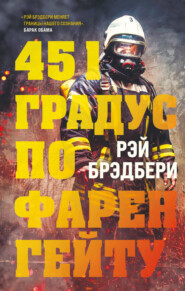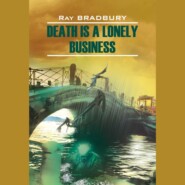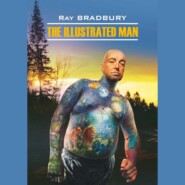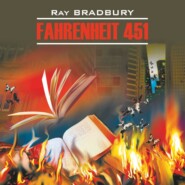По всем вопросам обращайтесь на: info@litportal.ru
(©) 2003-2024.
✖
Ray Bradbury 3-Book Collection: Fahrenheit 451, The Martian Chronicles, The Illustrated Man
Автор
Год написания книги
2019
Настройки чтения
Размер шрифта
Высота строк
Поля
‘Damn!’ said Beatty. ‘You’ve gone right by the corner where we turn for the firehouse.’
‘Who is it?’
‘Who would it be?’ said Montag, leaning back against the closed door in the dark.
His wife said, at last, ‘Well, put on the light.’
‘I don’t want the light.’
‘Come to bed.’
He heard her roll impatiently; the bedsprings squealed.
‘Are you drunk?’ she said.
So it was the hand that started it all. He felt one hand and then the other work his coat free and let it slump to the floor. He held his pants out into an abyss and let them fall into darkness. His hands had been infected, and soon it would be his arms. He could feel the poison working up his wrists and into his elbows and his shoulders, and then the jump-over from shoulder-blade to shoulder-blade like a spark leaping a gap. His hands were ravenous. And his eyes were beginning to feel hunger, as if they must look at something, anything, everything.
His wife said, ‘What are you doing?’
He balanced in space with the book in his sweating cold fingers.
A minute later she said, ‘Well, just don’t stand there in the middle of the floor.’
He made a small sound.
‘What?’ she asked.
He made more soft sounds. He stumbled towards the bed and shoved the book clumsily under the cold pillow. He fell into bed and his wife cried out, startled. He lay far across the room from her, on a winter island separated by an empty sea. She talked to him for what seemed a long while and she talked about this and she talked about that and it was only words, like the words he had heard once in a nursery at a friend’s house, a two-year-old child building word patterns, talking jargon, making pretty sounds in the air. But Montag said nothing and after a long while when he only made the small sounds, he felt her move in the room and come to his bed and stand over him and put her hand down to feel his cheek. He knew that when she pulled her hand away from his face it was wet.
Late in the night he looked over at Mildred. She was awake. There was a tiny dance of melody in the air, her Seashell was tamped in her ear again and she was listening to far people in far places, her eyes wide and staring at the fathoms of blackness above her in the ceiling.
Wasn’t there an old joke about the wife who talked so much on the telephone that her desperate husband ran out to the nearest store and telephoned her to ask what was for dinner? Well, then, why didn’t he buy himself an audio-Seashell broadcasting station and talk to his wife late at night, murmur, whisper, shout, scream, yell? But what would he whisper, what would he yell? What could he say?
And suddenly she was so strange he couldn’t believe he knew her at all. He was in someone else’s house, like those other jokes people told of the gentleman, drunk, coming home late at night, unlocking the wrong door, entering a wrong room, and bedding with a stranger and getting up early and going to work and neither of them the wiser.
‘Millie …?’ he whispered.
‘What?’
‘I didn’t mean to startle you. What I want to know is …’
‘Well?’
‘When did we meet. And where?’
‘When did we meet for what?’ she asked.
‘I mean – originally.’
He knew she must be frowning in the dark.
He clarified it. ‘The first time we ever met, where was it, and when?’
‘Why, it was at –’
She stopped.
‘I don’t know,’ she said.
He was cold. ‘Can’t you remember?’
‘It’s been so long.’
‘Only ten years, that’s all, only ten!’
‘Don’t get excited, I’m trying to think.’ She laughed an odd little laugh that went up and up. ‘Funny, how funny, not to remember where or when you met your husband or wife.’
He lay massaging his eyes, his brow, and the back of his neck, slowly. He held both hands over his eyes and applied a steady pressure there as if to crush memory into place. It was suddenly more important than any other thing in a life-time that he knew where he had met Mildred.
‘It doesn’t matter.’ She was up in the bathroom now, and he heard the water running, and the swallowing sound she made.
‘No, I guess not,’ he said.
He tried to count how many times she swallowed and he thought of the visit from the two zinc-oxide-faced men with the cigarettes in their straight-lined mouths and the electronic-eyed snake winding down into the layer upon layer of night and stone and stagnant spring water, and he wanted to call out to her, how many have you taken tonight! the capsules! how many will you take later and not know? and so on, every hour! or maybe not tonight, tomorrow night! And me not sleeping tonight or tomorrow night or any night for a long while, now that this has started. And he thought of her lying on the bed with the two technicians standing straight over her, not bent with concern, but only standing straight, arms folded. And he remembered thinking then that if she died, he was certain he wouldn’t cry. For it would be the dying of an unknown, a street face, a newspaper image, and it was suddenly so very wrong that he had begun to cry, not at death but at the thought of not crying at death, a silly empty man near a silly empty woman, while the hungry snake made her still more empty.
How do you get so empty? he wondered. Who takes it out of you? And that awful flower the other day, the dandelion! It had summed up everything, hadn’t it? ‘What a shame! You’re not in love with anyone!’ And why not?
Well, wasn’t there a wall between him and Mildred, when you came down to it? Literally not just one wall but, so far, three! And expensive, too! And the uncles, aunts, the cousins, the nieces, the nephews, that lived in those walls, the gibbering pack of tree-apes that said nothing, nothing, nothing and said it loud, loud, loud. He had taken to calling them relatives from the very first. ‘How’s Uncle Louis today?’ ‘Who?’ ‘And Aunt Maude?’ The most significant memory he had of Mildred, really, was of a little girl in a forest without trees (how odd!) or rather a little girl lost on a plateau where there used to be trees (you could feel the memory of their shapes all about) sitting in the centre of the ‘living-room’. The living-room; what a good job of labelling that was now. No matter when he came in, the walls were always talking to Mildred.
‘Something must be done!’
‘Yes, something must be done!’
‘Well, let’s not stand and talk!’
‘Let’s do it!’
‘I’m so mad I could spit!’
What was it all about? Mildred couldn’t say. Who was mad at whom? Mildred didn’t quite know. What were they going to do? Well, said Mildred, wait around and see.
He had waited around to see.
A great thunderstorm of sound gushed from the walls. Music bombarded him at such an immense volume that his bones were almost shaken from their tendons; he felt his jaw vibrate, his eyes wobble in his head. He was a victim of concussion. When it was all over he felt like a man who had been thrown from a cliff, whirled in a centrifuge and spat out over a waterfall that fell and fell into emptiness and emptiness and never – quite – touched – bottom – never – never – quite – no not quite – touched – bottom … and you fell so fast you didn’t touch the sides either … never … quite … touched … anything.
The thunder faded. The music died.
‘There,’ said Mildred.

















